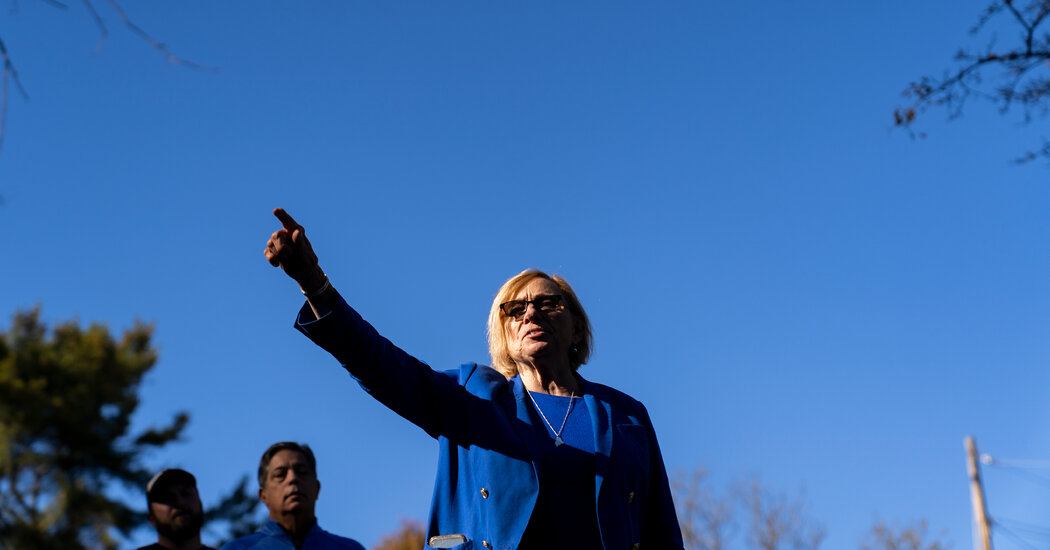Maine Governor Janet Mills became a political target after challenging President Trump at a White House meeting regarding his executive order banning transgender athletes in women’s sports. Following her defiance, the U.S. Department of Education opened a federal investigation into Maine’s education department, threatening to cut federal funds. Mills, a seasoned politician and the state’s first female governor, emphasized that her stance is about rule of law and civil rights. Known for her support of law enforcement and health care policies, she previously clashed with Trump on immigration and social issues, asserting that many states may face similar scrutiny.
Following her confrontation with President Trump during a White House meeting, Janet Mills, the Democratic governor of Maine, has transformed into a folk hero for her party, while also becoming a political target as her state is now subjected to a federal investigation by the Department of Education.
On Friday, Ms. Mills, 77, firmly told Mr. Trump that she would not comply with his executive order prohibiting transgender athletes from competing in women’s sports. “See you in court,” she declared, while seated among a group of bipartisan governors in the White House State Dining Room. Subsequently, the U.S. Department of Education notified Maine officials that the state’s education department was under a “directed investigation.”
Craig Trainor, the acting head of the U.S. Department of Education’s civil rights division, stated that the Trump administration “will do everything in its power to ensure taxpayers are not funding blatant civil rights violators.” He warned that Maine could lose federal funding if it failed to comply.
Ms. Mills remained defiant.
“Do not be misled: This is not merely about who can compete on the athletic field, this is about whether a president can force compliance with his will, disregarding the rule of law,” the governor asserted in a statement regarding the ongoing conflict. “I believe he cannot.”
This battle has propelled Ms. Mills, a well-known figure in Maine politics, into the national spotlight. Her opposition to the Trump administration’s strict immigration and anti-abortion policies played a significant role in her becoming the state’s first female governor.
Yet, her nearly five decades in state politics have been significantly shaped by her support for law enforcement and her experience as a criminal prosecutor.
Raised in Farmington, Maine, a center for agriculture and manufacturing, she comes from a political family. Her father, Sumner Peter Mills Jr., was a lawyer and Republican state legislator who served as the U.S. attorney for Maine under the Eisenhower and Nixon administrations.
After earning her degree from the University of Massachusetts and graduating from the University of Maine School of Law, Ms. Mills became Maine’s first female criminal prosecutor in the attorney general’s office. In a 1978 interview, she stated, “I like prosecuting murder trials the best.”
She then went on to become the first woman in New England to win a district attorney position, advocating for better treatment of domestic violence victims within the justice system. In 2002, she secured a seat in the State Legislature, and in 2009, she became Maine’s first female attorney general.
During her tenure as Maine’s lead prosecutor, Ms. Mills had numerous confrontations with Paul LePage, the conservative governor and a Trump supporter. When Mr. LePage vetoed legislation to enhance police access to opioid overdose medications, she utilized settlement funds to finance the treatment. She also refused to assist Mr. LePage in backing Mr. Trump’s 2017 ban on immigrants from predominantly Muslim countries, opting instead to challenge the executive order in court, leading to a failed lawsuit against her by Mr. LePage.
In 2019, with Governor LePage’s term ending, Ms. Mills was elected to lead the state.
Focusing on economic policies and expanding health insurance coverage, Ms. Mills has collaborated with legislators to prevent health insurers from discriminating against transgender individuals, allow gender-affirming hormone therapy for people aged 16 and older under specific circumstances, and enact a law protecting providers of gender transition care from lawsuits by other states.
While she has not passed any legislation concerning transgender athletes, the governor’s office does not have the authority to determine participation in high school sports. This decision is made by the Maine Principals’ Association, an independent organization that regulates student sports in the state.
Before the election, Mr. Trump appeared unaware of who Ms. Mills was. While campaigning in October, he mistakenly referred to her as a man during a call with supporters and falsely accused her of planning to bring 75,000 immigrants to the state. “He’s weak and ineffective,” Mr. Trump remarked.
While Vice President Kamala Harris won Maine, voters showed a leaning towards more conservative views than in previous elections. Ms. Mills responded to Mr. Trump’s victory with caution, informing the Portland Press Herald that she would support any policies benefiting Maine and oppose those that would be detrimental.
“It’s as simple as that,” Ms. Mills declared.
Following her altercation with Mr. Trump on Friday, she anticipated that Maine would not be the final state subjected to presidential investigations for defying orders that contradict the law.
“You must ask yourself: Who and what will he target next, and what actions will he take?” she questioned. “Will it be you? Will it be based on your race or religion? Will it be because you look different or think differently? Where does it end?”
